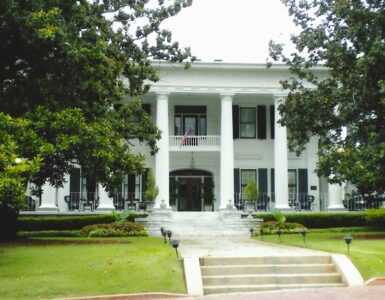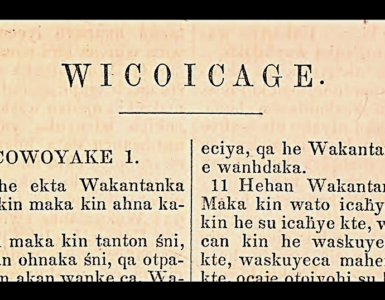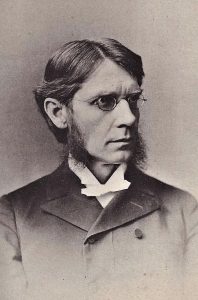 When one thinks of Bermuda it may bring to mind knee-length shorts, plush resorts, off-shore banking, or golf, but in the 1840s it was important to the British Empire as a sea port strategically located about 600 miles east of Cape Hatteras, North Carolina. The industrial revolution was charging ahead in Manchester and other English cities producing goods and machinery that were shipped to countries around the world. Also, Great Britain imported food, spices, raw materials, and other goods from both its colonies and other nations. Since the transatlantic crossing by the Great Western in 1838, the use of steam powered ocean-going vessels was increasing, but the tall-mast sailing ships continued to dominate the seas. Francis Landey was born to Mary Jane (Steele) and George John Bascombe Patton on Bermuda at Carberry Hill, January 22, 1843. It was an exciting place for a boy to grow up with ships and people from many nations visiting and providing Francis a cross-cultural experience as his parents raised him in Scripture and the Westminster Standards.
When one thinks of Bermuda it may bring to mind knee-length shorts, plush resorts, off-shore banking, or golf, but in the 1840s it was important to the British Empire as a sea port strategically located about 600 miles east of Cape Hatteras, North Carolina. The industrial revolution was charging ahead in Manchester and other English cities producing goods and machinery that were shipped to countries around the world. Also, Great Britain imported food, spices, raw materials, and other goods from both its colonies and other nations. Since the transatlantic crossing by the Great Western in 1838, the use of steam powered ocean-going vessels was increasing, but the tall-mast sailing ships continued to dominate the seas. Francis Landey was born to Mary Jane (Steele) and George John Bascombe Patton on Bermuda at Carberry Hill, January 22, 1843. It was an exciting place for a boy to grow up with ships and people from many nations visiting and providing Francis a cross-cultural experience as his parents raised him in Scripture and the Westminster Standards.
Young Francis learned to read when he was three years old and began studying Latin at the age of seven. After attending Bermuda’s Warwick Academy—established in 1662 and continues today—he moved to Canada to be taught in a grammar school in Toronto. His education continued in Knox College of the University of Toronto. He left for the United States to prepare for the ministry at Princeton Theological Seminary entering as a second year student and completing his work in 1865. In June he was ordained to the ministry by the Presbytery of New York. That same year on October 10, Patton married Rosa Antoinette who was the daughter of a Baptist minister, J. M. Stevenson.
Over the course of the next several years Patton served in a succession of short-term pastorates in New York until he moved to the Midwest. He was pastor of the Eighty-Fourth Street Presbyterian Church in Brooklyn until 1867 when he moved about forty miles up the Hudson River to the church in Nyack for a three-year call ending in 1870. The next ministry required a return to Brooklyn for about a year as the pastor elect of the South Church. In 1871, the Pattons relocated to Chicago for Francis to become the Cyrus H. McCormick Professor of Didactic and Polemic Theology in the Presbyterian Theological Seminary of the Northwest (McCormick Theological Seminary). When Charles Hodge’s Systematic Theology was published in 1872, Patton used it for his class text. A few years after starting at McCormick he added to his responsibilities pulpit ministry for the Jefferson Park Presbyterian Church serving as pastor elect for about four years until he was duly installed in 1879.
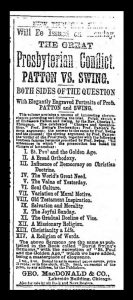 It was during his Chicago years that Dr. Patton was involved in the prosecution of Rev. David Swing for heresy. The events leading up to the trial began with Patton’s review of Swing’s sermon, “Old Testament Inspiration,” as published in August 1873 in the periodical Interior. As the events unfolded, Patton brought two charges against Swing before the Presbytery of Chicago. The text of materials covering the trial is available in The Trial of the Rev. David Swing, Before the Presbytery of Chicago, Edited by A Committee of Presbytery. Patton first charged that Swing had “not been zealous and faithful in maintaining the truths of the gospel; and … [had] not been faithful and diligent in the exercise of the public duties of his office as such minister” (p. 8). The first charge was supported with twenty-four specific items of concern including Swing’s teaching on doctrines such as the Trinity, divinity of Christ, eternal punishment, and justification by faith. The second charge stated that Swing had not sincerely received and adopted the Westminster Confession of Faith as the system of doctrine taught in the Bible (p. 13). To this charge, Patton provided four specifics. Running throughout the several specifications of the two charges was the observation by Patton that he believed Swing was a Unitarian. There was a lengthy trial with many witnesses and when the charges against David Swing were brought to a vote, he was exonerated by a margin of about three to one for each charge. Patton announced his plan to appeal to the Synod of Illinois, North, to which Swing responded by leaving the Presbyterian Church and becoming the pastor of the newly organized and fully independent Central Church of Chicago where he continued until his death in 1894.
It was during his Chicago years that Dr. Patton was involved in the prosecution of Rev. David Swing for heresy. The events leading up to the trial began with Patton’s review of Swing’s sermon, “Old Testament Inspiration,” as published in August 1873 in the periodical Interior. As the events unfolded, Patton brought two charges against Swing before the Presbytery of Chicago. The text of materials covering the trial is available in The Trial of the Rev. David Swing, Before the Presbytery of Chicago, Edited by A Committee of Presbytery. Patton first charged that Swing had “not been zealous and faithful in maintaining the truths of the gospel; and … [had] not been faithful and diligent in the exercise of the public duties of his office as such minister” (p. 8). The first charge was supported with twenty-four specific items of concern including Swing’s teaching on doctrines such as the Trinity, divinity of Christ, eternal punishment, and justification by faith. The second charge stated that Swing had not sincerely received and adopted the Westminster Confession of Faith as the system of doctrine taught in the Bible (p. 13). To this charge, Patton provided four specifics. Running throughout the several specifications of the two charges was the observation by Patton that he believed Swing was a Unitarian. There was a lengthy trial with many witnesses and when the charges against David Swing were brought to a vote, he was exonerated by a margin of about three to one for each charge. Patton announced his plan to appeal to the Synod of Illinois, North, to which Swing responded by leaving the Presbyterian Church and becoming the pastor of the newly organized and fully independent Central Church of Chicago where he continued until his death in 1894.
Dr. Patton continued his work in Chicago until he was called in 1881 to Princeton Seminary to become Professor of the Relations of Philosophy and Science to the Christian Religion which had been created specifically for him by a seminary benefactor named Robert L. Stuart. Robert and his brother Alexander had been donors to the seminary for several years including the provision of funding to construct Stuart Hall. Patton continued in his professorship until he was chosen to succeed James McCosh as president of Princeton College in 1888. There was some opposition to his appointment because he was a minister and it was thought he lacked sufficient business experience, but his commitment to Reformed theology as exemplified in the Swing case was deemed too sectarian. However, he overcame the opposition and became president with a tenure marked by faithful and dedicated service. Patton surprised even his closest associates when he resigned the university presidency in 1902 and nominated Woodrow Wilson as his successor. Shortly thereafter Patton became the first president of Princeton Seminary while continuing to teach ethics at the college and the seminary until his retirement in 1913.
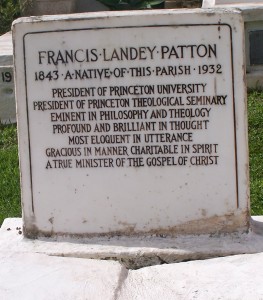 Francis Landey Patton returned to his Bermuda home for his remaining years. He would visit the United States annually and lecture in both of the Princeton institutions and at other locations in the nation. David Calhoun has noted that The Royal Gazette reported regarding Patton’s eighty-fifth birthday that the city of Hamilton unveiled an official portrait of him titled, “Bermuda’s Grand Old Man.” Dr. Patton lost his eyesight in his later years. He died in Bermuda in his ninetieth year on November 25, 1932, leaving his wife, Rosa, and three of their seven children as survivors. Patton was buried in the churchyard of the Church of Scotland’s Christ Church, which was the church in which he had been baptized so many years before.
Francis Landey Patton returned to his Bermuda home for his remaining years. He would visit the United States annually and lecture in both of the Princeton institutions and at other locations in the nation. David Calhoun has noted that The Royal Gazette reported regarding Patton’s eighty-fifth birthday that the city of Hamilton unveiled an official portrait of him titled, “Bermuda’s Grand Old Man.” Dr. Patton lost his eyesight in his later years. He died in Bermuda in his ninetieth year on November 25, 1932, leaving his wife, Rosa, and three of their seven children as survivors. Patton was buried in the churchyard of the Church of Scotland’s Christ Church, which was the church in which he had been baptized so many years before.
Patton was honored often during his years of teaching and pastoral ministry. He moderated the PCUSA General Assembly that met in Third Presbyterian Church, Pittsburgh, 1878, then when he delivered his sermon as the retiring moderator the following year his text was John 1:14, “The Word was made flesh and dwelt among us.” His honorary degrees included the DD from Hanover College, 1872, and Yale, 1888; the LL D was given by the College of Wooster, 1878, Harvard, 1889, University of Toronto, 1894, Yale, 1901, Johns Hopkins, 1902, University of Maryland, 1907, and Princeton University, 1913, which had also given him an honorary MA in 1896. Patton may be the minister with the most honorary degrees ever to live and work in Princeton.
He published in 1869 The Inspiration of the Scriptures, and several years later in 1898 he released A Summary of Christian Doctrine. His lecture, “Christian Theology and Current Thought,” was published in Addresses at the Induction of Rev. Francis L. Patton into the Cyrus H. McCormick Professorship of Didactic and Polemic Theology, in the Presbyterian Theological Seminary of the North-West, 1873. University campuses on occasion are not the irenic images of verdant quads published on postcards and such was the case for Patton when at the instruction of the trustees he addressed rowdiness and intemperance at Princeton in The Duty of Self-Control: An Address to the Students of Princeton University, in Marquand Chapel, Sunday Afternoon, January 30, 1898. His chief literary production is Fundamental Christianity which was published in 1926 and dedicated to his wife on the occasion of their sixtieth wedding anniversary. Some syllabi of Patton’s are available on Internet Archive including ethics, theism, and anti-theistic theories.
Patton’s strength ended up being his administrative and business abilities but these characteristics should not overshadow his academic gifts as exemplified by his early acquisition of reading and studying languages while watching the ships go by in Bermuda. It is a common attribute of several of the biographies posted on Presbyterians of the Past that early literacy and studying other languages indicates gifted intellects, so parents need to discern their children’s abilities as quickly as possible. There are several factors currently working against the youngest children learning to read and achieving facility with their own language, much less foreign ones, but as soon as a child can utter a word, language studies begin. Surely, not all children are endowed by their Creator with the same intellectual gifts, but Christian parents need to help their children do their best, after all, it is a matter of stewardship and sanctification. Education is a lifelong process and the sooner it begins, the better. There is no substitute for the desk at a mother’s knee.
Barry Waugh
Notes—Other than standard Presbyterian encyclopedias and biographical resources, David Calhoun’s, Princeton Seminary, vol. 2, 94-95, was helpful and the information on Patton’s portrait in Bermuda is from endnote 12, p. 522; the entry for Patton in the Dictionary of American Biography, ed. Dumas Malone, vol. 14, Oglethorpe-Platner, New York: Charles Scribner’s Sons, 1934, is very helpful but emphasizes Patton’s work at the college while little is said about his seminary work. The website for Warwick Academy mentions Dr. Patton as one of its “well remembered” alumni. The grave marker picture was located on Find-a-Grave and was taken by Rosalie Ann, Nov. 15, 2013. The Eighty Fourth Street Presbyterian Church no longer exists as a separate congregation because it merged many years ago with another church to form what exists today as West-Park Presbyterian Church at 165 W. 86th Street. McCormick Theological Seminary was renamed in 1886 for its chief benefactor and Old School proponent Cyrus H. McCormick. The newspaper clipping about Swing and Patton is from the Chicago Daily Tribune, Chicago, May 24, 1874 as from the Library of Congress digital collection; it is sad that Chicagoans’ impression of Presbyterians is given as rounds of a boxing match.



